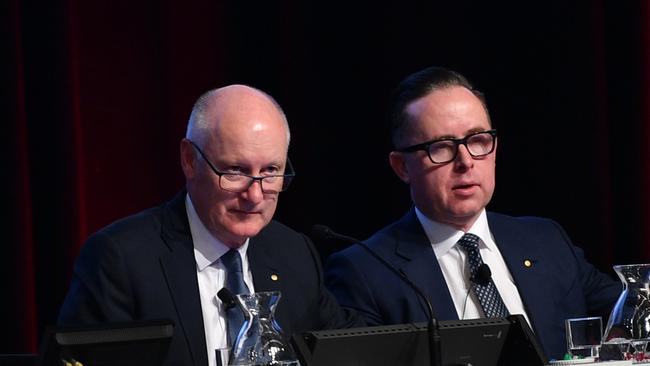Qantas board quizzed on climate, diversity
Qantas’s board has faced a barrage of questions on everything from climate change to Todd Sampson’s relevance at its AGM.

Qantas’s board of directors has faced a barrage of questions on everything from climate change to Todd Sampson’s relevance at its annual general meeting in Adelaide.
Despite a small turnout of just 31 shareholders, chairman Richard Goyder and chief executive Alan Joyce were kept on their toes for the bulk of the two-hour, 10-minute meeting.
Mr Goyder opened proceedings with a glowing rundown of the airline’s achievements in the last year, and nominated climate change and Asia as two of the biggest global forces shaping Qantas’s operations.
Mr Joyce noted the upcoming 99th birthday of Qantas on December 16, and the resilience shown by the airline in a “difficult operating environment”.
“General business and consumer confidence are softer now than in the past few years. The dollar has weakened. Trade wars are impacting freight demand,” Mr Joyce said.
“We are feeling the effects of all of that — as you’d expect, but our fundamentals are sound.”
But shareholders were less interested in the financial performance than Qantas’s lack of international flights out of Adelaide, its commitment to regional Australia and environmental initiatives.
Australian Shareholders Association representative Bob Ritchie wanted to know if director and television personality Todd Sampson was a disruptive presence at board meetings.
“I think all of our directors are independently minded,” Mr Goyder responded.
“Todd certainly speaks up, but he’s collegiate and we all listen to him when he brings an independent view. His style of dress also gives us a licence to be less formal and more radical in some of our thinking.”
Diversity was also raised, with Australasian Centre for Corporate Responsibility executive director Brynn O’Brien pointing out the lack of racial diversity represented on the Qantas board.
Mr Goyder assured her that was something he would like to address while Mr Joyce insisted the board was “probably one of the most diverse” in corporate Australia.
“You’ve got four women and a gay man on the board, and we are very diverse in the senior management team as well,” said Mr Joyce.
“Qantas should be celebrated for the successes made in that space.”
He also defended Qantas’s environmental credentials, pointing out it had achieved a 1.5 per cent reduction in carbon emissions since 2009 and oversaw the largest offsetting program of any airline worldwide.
Resolutions regarding the Mr Joyce’s participation in the long-term incentive program, the remuneration report, and the re-election of Mr Goyder, Paul Rayner, Barbara Ward and Mr Sampson were passed.
But for the second year in a row, the ACCR’s attempt to change the constitution to allow a question on the involuntary transportation of asylum-seekers was soundly defeated.
Mr Goyder said extensive consideration had gone into the company’s position on the matter and the board had concluded a review of its policies was not warranted.
“It would be impossible, and frankly inappropriate, for an airline to determine the legal status of an individual without access to sensitive case files and the right expertise to interpret them,” Mr Goyder said.
He and Mr Joyce dismissed the suggestion they were hypocritical in standing up for issues such as marriage equality and gender diversity, but not asylum- seekers.
“The ACCR for all of its good work, is using the Qantas brand to try to change government policy on this thing, and I think you should be doing it outside of business meetings such as this,” said Mr Joyce.




To join the conversation, please log in. Don't have an account? Register
Join the conversation, you are commenting as Logout